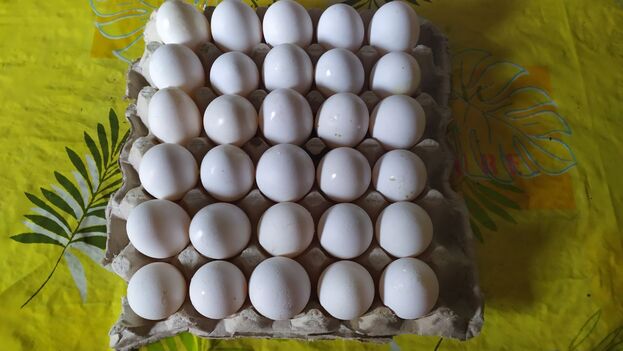
![]() 14ymedio, Havana, 4 November 2020 — After looking for eggs for two weeks, Leonel has no choice but to accept the law of the street and pay more than five pesos for each one.
14ymedio, Havana, 4 November 2020 — After looking for eggs for two weeks, Leonel has no choice but to accept the law of the street and pay more than five pesos for each one.
“I just bought a carton of 30 eggs for 175 pesos, each one is more than 5.80 [Cuban pesos, roughly 25¢ USD]. If it is not a record, it is a good average,” says Leonel, a resident of Espada and San Lázaro, in Centro Havana “Of course it was on the black market, and the State does not sell unrationed eggs anywhere, at least I have not seen them,” he said.
“People are crazy looking for food, in the stores there are tremendous crowds, many people on the street looking, but there’s nothing, less than nothing. Those who sell on Telegram and WhatsApp are all paranoid because they do not want to be on the news,” added the young man.
In Santiago de Cuba, a city many found cheaper to live in than the capital, prices have been skyrocketing for some time and there is no limit.
“You could find a carton of eggs in the middle of a pandemic for 100 pesos, but right now there aren’t any. Not even in the stores that only take MLC (freely convertible currency), because yesterday I went out to see what I could find to cook and there was only cheese and mortadella, very expensive, and nothing else,” a resident of the Veguita de Galo neighborhood told 14ymedio.
“A few days ago I gave 8 CUC [Cuban convertible pesos*] for a carton and I was happy to find them even at that price. The eggs are gone, you only see them once a month and that’s only because you get them on the rationbook. After that you can’t find them anywhere at any price,” explained the woman from Santiago.
The price is the highest in two decades, according to this newspaper. From the beginning of this century, a carton of eggs did not exceed 120 CUP, or 4 pesos each, a basic indicator of the galloping inflation that is being experienced on the island. “I paid 150 Cuban pesos (CUP) for 30 eggs in 1997 and now the nightmare repeats itself and is worse,” says a 68-year-old man from Havana.
But the egg carton radiates many realities. Candy vendors, confectioners, pastry chefs, those who offer empanadas in their restaurants and those who prepare products for birthday parties or weddings depend on the product. A rise in its price causes unpredictable consequences.
“Cake with meringue frosting, croquettes and cold salad for 20 people,” reads an ad on a popular classifieds site. “Now it is 150 CUC*, we have had to raise the price because eggs are more expensive,” the seller says when she gets a call asking the price. “Buy now, even if the birthday is next week because this is going to keep going up,” she tries to persuade customers.
Last month, Marino Murillo Jorge, head of Cuba’s Commission for the Implementation of the Guidelines, announced on the Roundtable TV program what was ahead with the “realignment” and the unification of the currency. “What is going to happen in Cuba is that some prices will remain as they are, others will rise, and I think we can’t forget that incomes will also go up.”
For the moment, the official has only been correct with his forecasts regarding prices.
“I don’t know where we are going to end up with the prices. A pound of tomatoes is 35 pesos, one of pepper the same price and a string of onions is 12 CUCs. And they have not raised wages yet!” laments the resident. of the Cast Veguita de Galo.
*Translator’s note: Until recently a Cuban convertible peso (CUC) was worth roughly one US dollar, but with the pending retirement of the CUC, relative values are changing daily. The government wage in Cuba is roughly the equivalent of $40 USD a month.
____________
COLLABORATE WITH OUR WORK: The 14ymedio team is committed to practicing serious journalism that reflects Cuba’s reality in all its depth. Thank you for joining us on this long journey. We invite you to continue supporting us by becoming a member of 14ymedio now. Together we can continue transforming journalism in Cuba.
